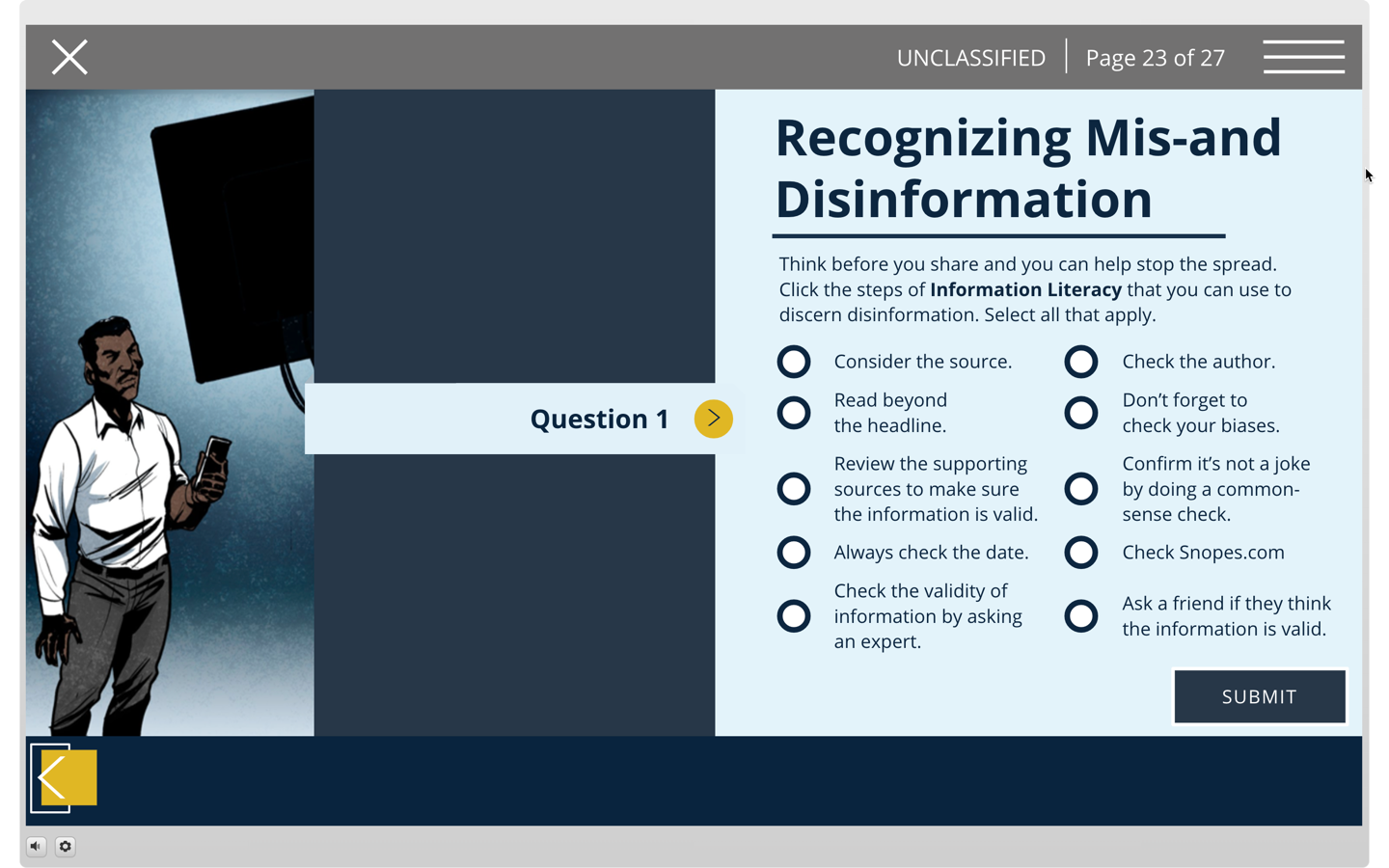Scenario-based training with ‘graphic novel’ illustrations and soundscapes in storyline























































These four projects were all for the Department of State and designed to be highly media-heavy and interactive. The design process involved reimagining their current in-person training as self-directed asynchronous digital experiences and also providing solutions for how these digital assets would support in-person training experiences. Because our team was assembled and collaborating remotely and the content for Special Agent Traning is classified, we created a customized media and content review process which allowed us to work remotely without the risk of disclosing sensitive information. To share the visuals and learning experiences outside the Department of State, I co-wrote, designed, and developed, [and subsequently was assigned the role of instructor], a demo that reflected the user experience and design approach but could be shared. Here is the Demo.
Special Agent Training Project Descriptions
Legal I: As creative lead and learning experience design director for these projects, the first of the departments I worked with was Legal I: Special Agent Training. For these seven modules or micro courses, I collaborated with agent SMEs in their Legal department to develop scenario-based interactive learning experiences around topics such as the Use of Force, and Wiretapping Surveillance. These micro courses were led by an illustrated avatar of each of the DoS Legal instructors, each of whom recorded the voiceovers for all lecture content to act as a seamless extension to their in-person training sessions. These Storyline pieces were segmented into a series of SCORM packages with were uploaded to the client’s LMS. These pieces included illustrated scenarios that allowed the user to view illustrations with VO and soundscape recordings and then periodically they were asked to make choices that would lead them down various paths to demonstrate cause and effect. Users also encountered integrated knowledge checks throughout the module.
Passport Securities: In addition to the Legal division, we revised and rebuilt DoS’s Passport Securities which involved updating and expanding on their previous digital course. To enhance the user experience, we created digital tools within the course that allowed users to zoom in on and examine legal documents under a variety of lighting conditions and then designed assessments using these tools to detect fraud.
Criminal Investigations: For Crim, we created digital components that integrated with their in-person training for their Criminal Investigations division. Due to restricted access to the Dept. of State’s information databases regarding US Citizens’ personal information, we had to design and develop simulations of three of their databases so trainees could enter information on fictional characters and interact with a variety of search criteria such as license plates and last know addresses. This course also included branching scenarios with embedded knowledge checks and interactive learning assessments and used a graphic novel style media approach, however, the color pallet geared more toward warmer tones and reflected more the unique branding for the Dept. of Criminal Investigations.
Foreign Affairs Counter Threat: This mandatory asynchronous training for DoS’s Foreign Agent Counter Threat division, or eFACT, asynchronously trains all federal employees and their family members who are required to travel outside the United States in safety and security response practices for situations such as local law enforcement detainment or an attack on a US Embassy. While the previous projects contained lecture content and topic-specific explainer videos, this training was designed to walk the user through very similar experiences that they would encounter during the on-site training through interactive storytelling that followed 5 trainees who experienced varying degrees of situational severity. A key criterion for this project was that they wanted to use the likenesses of several of the eFACT staff in photo-realistic scenarios-based illustrations that incorporated knowledge checks with feedback loops that scaffolded information to support reasoning.
All in all, these trainings are completed by approximately 50k special agents and federal employees a year and UMGC DoS is continuing to expand on their eLearning options.